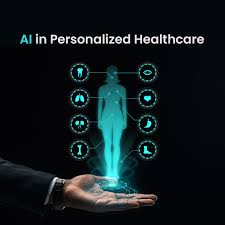Unlocking the Potential of AI in Personalized Medicine
Personalized medicine, a transformative approach to healthcare, seeks to tailor medical treatment to the individual characteristics of each patient. It has revolutionized the traditional “one-size-fits-all” method of diagnosis and treatment by factoring in the genetic, environmental, and lifestyle differences between individuals. Artificial intelligence (AI) is emerging as the key enabler of this revolution. By analyzing vast datasets and uncovering patterns that are beyond human capabilities, AI holds the potential to redefine how we diagnose, treat, and prevent diseases, pushing personalized medicine into the future.
1. The Intersection of AI and Personalized Medicine
AI’s core strength lies in its ability to process enormous volumes of data and identify meaningful correlations, often hidden to the human eye. In healthcare, this is particularly valuable given the complexity of human biology and the vast amounts of patient data generated from electronic health records (EHRs), genetic sequencing, imaging studies, and wearables.
Personalized medicine requires vast data to understand how individual variability affects health and disease. AI can swiftly analyze genomic data, lifestyle factors, and even environmental exposures to provide personalized recommendations. With machine learning algorithms that can “learn” from data, AI can predict patient outcomes, suggest tailored treatments, and even provide early warnings for potential health risks based on real-time data analysis.
2. AI in Genomics: Tailoring Treatment Based on DNA
One of the primary pillars of personalized medicine is genomics—the study of a patient’s genes to guide medical decisions. AI is transforming genomics by helping researchers and physicians analyze complex genetic information more quickly and accurately than ever before.
AI algorithms can rapidly sift through millions of genetic variants, pinpointing the specific genes or mutations that may be responsible for a patient’s disease. This has particular value in cancer treatment, where identifying mutations can guide therapies such as targeted treatments or immunotherapy. For instance, AI-driven platforms are helping oncologists decide whether patients with certain mutations might respond better to a specific drug or treatment protocol.
Moreover, AI is playing a role in predicting the likelihood of developing certain hereditary conditions. By integrating genomic data with other health information, AI can help identify patients at high risk for diseases such as heart disease, diabetes, or Alzheimer’s, allowing for earlier interventions and preventive care.
3. AI in Drug Discovery and Development
Developing a new drug is a time-consuming and expensive process. AI is helping to shorten the drug discovery timeline and reduce costs by identifying promising drug candidates faster and more efficiently. Traditionally, drug discovery involved testing thousands of compounds in the lab to find one that was both safe and effective. AI, however, can rapidly simulate how a drug interacts with the body at a molecular level, predicting which compounds are most likely to succeed.
AI’s ability to analyze large biological datasets also allows for repurposing existing drugs for new treatments, especially for complex diseases like cancer and neurological disorders. AI-driven drug discovery platforms analyze how existing drugs interact with various proteins, cells, and tissues, uncovering novel uses for established medications. For example, AI algorithms helped identify several pre-existing drugs that could be repurposed to treat COVID-19 during the pandemic.
In personalized medicine, AI can identify how a patient’s unique genetic makeup may influence their response to certain drugs, enabling physicians to select treatments that are more likely to be effective with fewer side effects. This is especially important in the case of complex diseases where the genetic variability among patients can significantly impact treatment outcomes.
4. AI-Powered Diagnostics and Early Detection
One of the most promising applications of AI in personalized medicine is in diagnostics and early disease detection. AI algorithms are increasingly being used to analyze medical images such as X-rays, CT scans, and MRIs, providing faster and more accurate diagnoses than traditional methods.
For example, AI-powered image recognition tools are already being used to detect early-stage cancers, including breast cancer and lung cancer, with high accuracy. AI is capable of recognizing subtle patterns in imaging that may be missed by the human eye, allowing for earlier detection and better treatment outcomes. In some cases, AI can predict the likelihood of a lesion becoming cancerous, enabling preventive measures before the disease progresses.
AI’s potential extends beyond imaging. Wearable devices and health monitoring sensors generate continuous streams of data, including heart rate, sleep patterns, blood sugar levels, and more. AI can analyze these real-time data streams to detect early signs of diseases like diabetes, heart disease, or even neurodegenerative conditions such as Parkinson’s or Alzheimer’s. By detecting early warning signals, AI can alert patients and doctors to potential health risks before symptoms become serious, enabling early interventions that can significantly improve patient outcomes.
5. AI in Personalized Treatment Plans
AI is also revolutionizing how treatment plans are created and managed, making personalized medicine more effective. Machine learning algorithms can analyze a patient’s medical history, genomic data, and current health status to recommend treatments that are tailored to the individual’s specific needs.
For instance, in cancer treatment, AI systems can help oncologists design personalized treatment plans by analyzing a tumor’s genetic mutations and predicting which treatments are most likely to be effective. This ensures that patients receive targeted therapies that are more likely to work based on their unique genetic profile.
AI is also playing a critical role in chronic disease management. Conditions like diabetes, hypertension, and asthma require constant monitoring and individualized care plans. AI-powered platforms can track patient data over time, providing recommendations on medication dosages, lifestyle adjustments, and potential interventions based on the patient’s condition. By continuously learning from patient data, these AI systems can adapt treatment plans in real-time, ensuring that care is always optimized for the individual’s current health status.
6. Ethical Considerations and Challenges
Despite the immense potential of AI in personalized medicine, it is essential to address several ethical and practical challenges.
a. Data Privacy and Security
AI systems rely on vast amounts of personal health data, including genetic information, medical histories, and real-time monitoring from wearable devices. Ensuring the privacy and security of this data is crucial. Healthcare providers and technology companies must implement strict data protection measures to prevent breaches and unauthorized access to sensitive information.
b. Bias in AI Algorithms
AI algorithms are only as good as the data they are trained on. If the data used to develop AI systems is biased or incomplete, the resulting recommendations and predictions could disproportionately affect certain populations, leading to unequal healthcare outcomes. This is particularly concerning in genetic research, where many datasets have historically been dominated by individuals of European descent, potentially limiting the applicability of AI tools for patients from other ethnic backgrounds. Ensuring that AI algorithms are trained on diverse and representative datasets is essential for equitable personalized medicine.
c. Regulatory and Clinical Validation
AI-driven healthcare tools must undergo rigorous clinical validation to ensure their accuracy and effectiveness. Regulatory agencies, such as the FDA, must establish clear guidelines for the approval and deployment of AI systems in personalized medicine, ensuring they meet the highest standards of safety and efficacy.
7. The Future of AI and Personalized Medicine
The potential of AI in personalized medicine is vast, and we are only scratching the surface of what is possible. As AI technology continues to advance, the integration of AI-driven tools into routine medical practice will become more widespread. Some key areas of future development include:
- Predictive Analytics for Preventive Care: AI will continue to advance in predictive analytics, allowing healthcare providers to anticipate diseases and health issues long before they manifest. This will shift the focus of medicine from reactive treatments to proactive prevention, improving overall health outcomes and reducing healthcare costs.
- AI-Driven Virtual Health Assistants: Virtual assistants powered by AI are likely to become common in personalized medicine, helping patients manage their health on a day-to-day basis. These virtual assistants will analyze health data, provide real-time recommendations, and even schedule appointments, empowering patients to take a more active role in their healthcare.
- Integration of AI with CRISPR Technology: The combination of AI and gene-editing technologies like CRISPR holds immense potential for personalized medicine. AI can help identify genetic mutations that cause diseases, while CRISPR can precisely edit these mutations, offering targeted treatments and even potential cures for genetic disorders.
Conclusion
AI is unlocking the true potential of personalized medicine, offering new ways to diagnose, treat, and prevent diseases based on the unique characteristics of each patient. From analyzing genomic data to predicting disease risks and creating tailored treatment plans, AI is poised to transform healthcare, making it more precise, efficient, and accessible. However, the journey to fully realizing the promise of AI in personalized medicine requires addressing ethical, regulatory, and practical challenges. As AI continues to evolve, the future of personalized medicine looks brighter than ever, with the potential to improve health outcomes for millions around the world.


